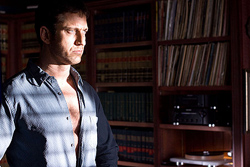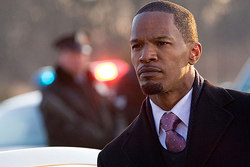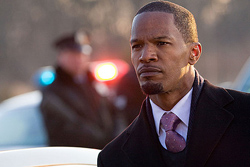Can you imagine a major Hollywood studio releasing a movie that is blatantly, unashamedly pro-terrorism? Of course not; for obvious reasons, terrorism is not something that any rational person would ever condone, and to make a movie that supports it would be, if nothing else, financial suicide. But that’s essentially what we have with Law Abiding Citizen. It may not put a smiley face on the Taliban, yet its plot centers around a violent genius who brutally kills innocent people as a way of enacting revenge on a government with which he has grievances. And though it’s not entirely clear, I think the movie actually wants us to sympathize with the guy.
Or at least, it doesn’t allow us to be totally repulsed by him. The character in question is Clyde Shelton (Gerard Butler), a tinkerer whose few minor inventions have earned him a fair amount of money. The film opens with a brief moment of tenderness, between him and his daughter, before spiraling into a relentless onslaught of cruelty: A pair of invaders break into his house and brutally rape and kill his wife before murdering the child. Clyde looks on, helpless, and is, for some reason, left alive.

We see the pain written on his face, but his case is not so airtight in the eyes of the district attorney’s office. His lawyer, Nick (Jamie Foxx), suspects that it will be impossible to convict both men, and that it’s likely for both to walk free. So he makes a deal for one of the criminals to go free while the other goes to Death Row—in his eyes, the closest thing to justice that Clyde will get.
Then we fast forward ten years. Both criminals are still alive, and Clyde has spent the decade constructing an implausibly elaborate, completely absurd revenge plot, which goes something like this: He kills the two criminals, is imprisoned, then—from his prison cell, mind you—somehow manages to kill off every lawyer and judge who had anything to do with the legal decision from ten years prior.
Don’t get me wrong: The movie kinda-sorta makes him out to be a monster, which of course he is. But we also see him wistfully handling the bracelet his daughter made him before she was killed, and, for a brief moment, the film asks us to put ourselves in his shoes. Which is perfectly fine, except it also goes out of its way to show us that the legal system really is a joke, and that Clyde really was given a raw deal. The film implicitly accepts the demands that he so violently makes of the government.

And then, at the end—quasi-spoiler alert, though there really isn’t much to spoil—the roles are reversed: The only way for him to be brought to justice is for all pretenses of civil rights and legality to be dropped and for “justice” to be dealt by a crude act of vigilantism.
Clyde says, at one point, that he is simply interested in doing what is right, but the film itself doesn’t seem to share his concern. This is a film that appeals to all of our basest instincts: It combines the brutal onscreen torture of the Saw movies with the revenge fantasia of, well, any number of movies, most recently InglouriousBasterds. It rubs violence in our faces and expects us to applaud it and approve of the gross wrongdoings that are being committed. There’s one scene, toward the beginning of the movie, that is perfectly representative of its moral bankruptcy: We survey a scene of shocking carnage and gore, but rather than pause to morn the loss of human life, the film uses the scene as the setup for a dumb punchline. A punchline.
If it seems like I’m presenting a moral treatise instead of a review, that’s because the movie is, basically, a moral (or perhaps amoral) discourse in the guise of a thriller. I suppose I could say something about the craft, but there’s little to say: The production values are essentially those of any TV crime procedural, with the added star power of Butler and Foxx. They’re both fine, but unremarkable; the only thing that almost makes me want to give the movie half a star is Viola Davis as the city’s mayor, as reliably intense and mesmerizing as she was in Doubt.

But no, that’s not enough to even partially redeem a movie so shamelessly crass and blatantly stupid. (The big reveal, where we see just how Clyde did it, is appallingly implausible.) Celebrating vigilantism and reveling in violence, it’s a movie that dismisses the value of human life, completely muddles the idea of justice, and displays contempt not just for the criminal justice system, but for government itself—essentially, for all parts of human civilization. There oughta be laws against films like this.
Talk About It
Discussion starters- What, if anything, does the film have to say about the concept of justice? Is justice ever served, to anyone in the film?
- What attitude does the movie take toward the law and the government?
- Do you think the movie gives due weight to human suffering and death?
The Family Corner
For parents to considerLaw Abiding Citizen is rated R for bloody, brutal violence, a scene of rape, and pervasive language. The violence is extremely graphic, including some scenes of torture. There is brief nudity, and very harsh language. Definitely not for kids, and, arguably, not for anyone.
Photos © The Film Department
Copyright © 2009 Christianity Today. Click for reprint information.











